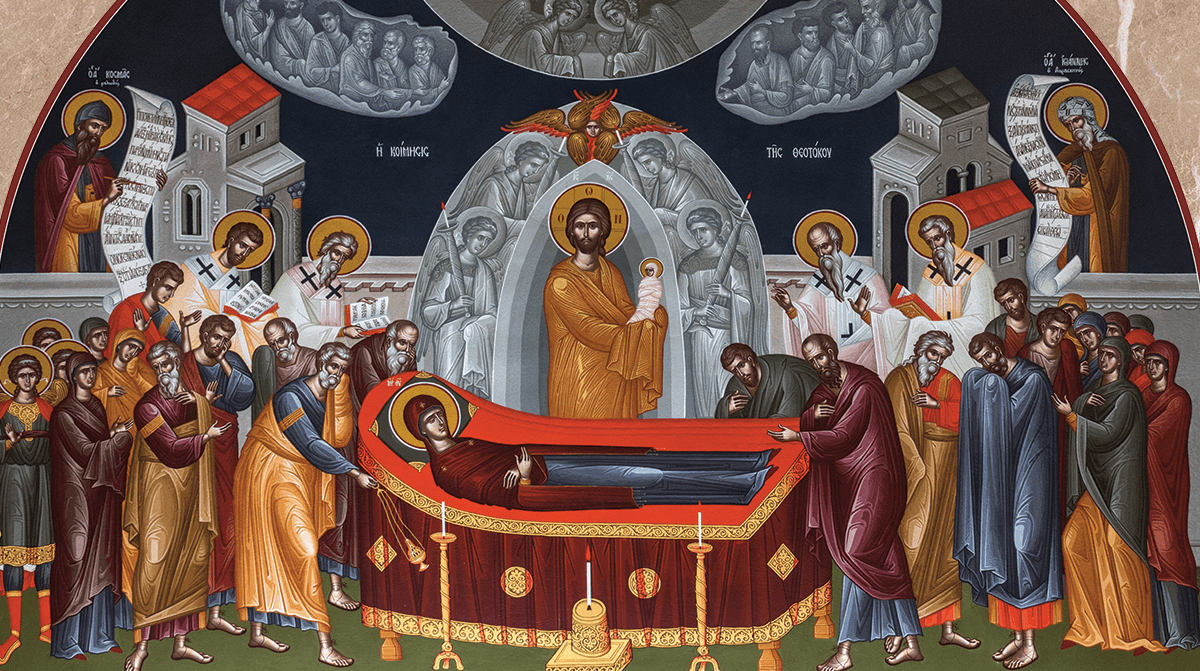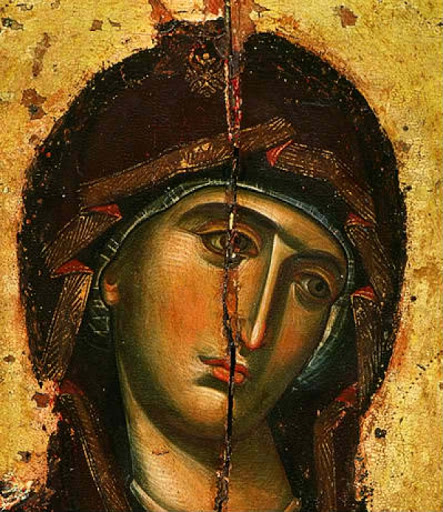
We call Christ’s Mother “all-holy”, because she is above all the saints. She is the “crown and perfection of every saint” (St Gregory Palamas). She did not commit any sin during her life, as from the age of three until the age of fifteen, when she conceived Christ “by the Holy Spirit”, she lived in the Holy of Holies and reached deification. She is “immaculate”, undefiled and pure of every sin or thought in body and soul. She is “most blessed” because she received great grace from the fullness of God’s grace. She is “glorious” because she is full of the glory of God, for even her Dormition was glorious. She is called “Lady”, because she gave birth to the Lord of all, Christ. In this sense she is also described as “Sovereign Lady”. Her intercession and her prayers have great power and she is “the Protection of Christians that cannot be put to shame.” She is the “Mother of God” because she did not give birth to a mere man, but to the Second Person of the Holy Trinity, Who is God. And she is the “Ever-Virgin Mary” because she is a virgin before the birth, during the birth and after the birth, as the iconographers indicate on the holy icons by the three stars on her forehead and both her shoulders.
*
We love her next after God. Christ is the mediator between us and God the Father, but the All-Holy Virgin is the mediator between us and Christ. How this comes about is a mystery understood by those who walk in the way of salvation.
This is why we ask for the intercessions of the Theotokos, but we also commend our whole life and the life of our fellow human beings to Christ. We not only pray, but we entrust ourselves absolutely to God. When someone prays but does not commit himself to God’s providence he is not really helped.
“Most Holy Mother of God, Save us”

To the prayers that the Priest addresses to the Most Holy Theotokos during the Divine Liturgy and other church services, the people reply through the chanter: “Most Holy Mother of God, save us.” At other times, of course, we say that the Theotokos intercedes to God for us: “By the prayers of the Mother of God, O Saviour, save us.” There is no contradiction or inconsistency between the two verbs ‘save’ and ‘intercede’ in this particular case.
Christ is the true Saviour of humankind. He became incarnate and saves us from death, sin and the devil, provided that we ourselves respond and co-operate in this work. In the strict sense of the word, therefore, the real Saviour is Christ. This is, in any case, what the name ‘Jesus’ means, according to the angel’s message to Joseph: “And you shall call His name Jesus, for He will save His people from their sins” (Matt. 1:21).
The verb ‘save’, however, apart from its principal meaning, also has a secondary meaning that denotes someone who assists in salvation, who is instrumental in salvation. There are many scriptural passages that use the verb in this sense. For example, the Apostle Paul writes: “I have become all things to all men, that I might by all means save some” (1 Cor. 9:22), and St James the Brother of the Lord writes: “He who turns a sinner from the error of his way will save a soul from death and cover a multitude of sins” (Jas. 5:20).
So when interpreting the phrase, “Most Holy Mother of God, save us”, it should be noted that Christ is the pre-eminent Saviour of humankind, but the All-Holy Virgin also saves in the secondary sense, because she became the Mother of Christ and gave birth to God as man. The work of the Theotokos is higher than the work of the saints, who make intercession. The prayers of the saints cannot be put on the same level as the prayers of the Theotokos, because, as the Mother of God, who has risen and is in heaven with her body, and who enjoys the glory of her Son, she has greater boldness towards God.
St Germanus of Constantinople writes that no one is saved except through the Theotokos, no one is delivered from dangers except through the Theotokos, and no one receives a gift from God except through the Theotokos. “No one is saved, if not through you, Theotokos. No one is free from dangers, if not through you, Virgin Mother. No one is redeemed, if not through you, Mother of God. No one receives the gift of mercy, if not through you, who have contained God.”
The repetition of the words “no one” is striking. This is linked with the fact that the All-Holy Virgin became the dwelling-place of the Holy Spirit, through Whose power she conceived the Son and Word of God. Therefore St Germanus says: “For man became spiritual when you, Mother of God, became the dwelling-place of the Holy Spirit.” And he says that we have also acquired knowledge of God through her. “No one is filled with divine knowledge, if not through you, All-Holy Virgin.”
St Germanus of Constantinople’s whole theological thinking is that the Most Holy Theotokos was found worthy to become the Mother of Christ and to offer the greatest benefit to humankind. The person and work of the Most Holy Mother of God is inconceivable apart from the person and work of Christ. This is why he repeats “no one” again and again, and describes the Mother of Christ as “Theotokos”, “All-Holy Virgin”, “Virgin Mother”, “Mother of God” and “the one who contained God”.
St Gregory Palamas refers to the Mother of God’s great contribution to our salvation. He writes that the Theotokos is closer to God than those who draw near to Him, namely, the saints and angels, so “she is able to intercede more powerfully than all.” Her prayers take precedence. Since the Mother of God alone is the boundary “between created and uncreated nature”, “no one can come to God unless he is truly illumined by her, the true lamp of divine brightness.” The All-Holy Virgin is truly the divinely radiant lamp, because “God is in her midst; she shall not be shaken” (Ps. 45[46]:5), and she illuminates and sheds light on the faithful.
The Mother of God’s significant contribution did not end when she gave birth to Christ, nor will it end at the Second Coming of Christ. Until then she will pray for people, particularly for those who make supplication to her, but she will continue to contribute in the age to come, because “for endless eternity all progress towards the manifestation of divine light, every revelation of divine mysteries, and spiritual gifts of any kind are beyond everyone’s grasp without her.” This is because the Theotokos was the first to receive the fullness of God’s gifts and she makes it possible for all to contain this fullness, distributing to each according to his purity. Thus the Theotokos is the steward in charge of God’s riches.
St Gregory Palamas speaks in this manner because he had personal experience of the Mother of God’s great gift and offering. As his biographer, St Philotheos, Patriarch of Constantinople, writes, at the beginning of his monastic life on the Holy Mountain St Gregory, as well as fasting and keeping vigil, prayed unceasingly day and night, “setting the Mother of God before him as his guide, protector and mediator,” and bringing her constantly before his eyes with words, prayers and movements of his nous. Once when he was in a state of hesychia he saw St John the Evangelist in a vision (not a dream). St John told him that the Sovereign Lady above every saint had sent him to ask him (St Gregory) why he prayed continuously day and night, saying, “Lighten my darkness, lighten my darkness.” St Gregory replied to St John that, being a man full of passions and sins, there was nothing else he could ask for except mercy and illumination. Then St John answered that the Sovereign Lady had commanded through him that St Gregory should not lose heart or have doubts: “For I myself will help you.” When St Gregory asked him whether the Mother of the Lord would help him in this life or the next, St John replied “In the past and now, and in the future.” After that St John disappeared, having satisfied St Gregory with those divine words, “and having filled him ineffably with the great gifts of the Mother of God.”
This incident shows the great glory possessed by the Virgin Theotokos. Her grace is not the grace of a saint, even of a great saint. Rather, she is full of the gifts of grace of the Holy Spirit which Christ bestowed upon her, and, at the command of her Son, she bestows these gifts on those who pray. St Gregory Palamas prayed to God, saying “Lighten my darkness,” but he also had the Theotokos always before him, and Christ gave him the spiritual gift of noetic prayer, divine vision, through the Theotokos. We see the same thing in the lives of all the saints. The Theotokos does not act on her own, but in obedience to Christ.
This Orthodox teaching about the active participation of the Theotokos in our salvation has nothing to do with the Roman Catholic dogma that the All-Holy Virgin is Corredemptrix. This doctrine evolved over time, but the term Corredemptrixappeared in the fifteenth century in the West. The Western view that the Mother of God is Corredemptrix refers not only to the “word of the incarnation” but also to the “manner of the redeeming sacrifice”. According to this view, the All-Holy Virgin not only co-operated in the incarnation of the Son and Word of God, but also co-operated in Christ’s sacrifice on the Cross. In other words, she participated in the agonies of Christ on the Cross and made them her own. And Christ gave His Mother the ‘merits’ that He Himself possessed, so as to enable the Theotokos to grant to everyone the gifts that Christ had acquired through His death and His blood. This novel theory also entered the devotional practice of the Franco-Latins with the rosary.
This view that the Theotokos is Corredemptrix is linked with the theory of merits, according to which God the Father gave grace to the Son as ‘payment’ for the work that He accomplished, and Christ gave these gifts to His Mother as well, because she shared in His suffering on the Cross. These beliefs are unacceptable from an Orthodox standpoint. The Theotokos co-operated in the incarnation of Christ. She was instrumental in the incarnation, but she was not ‘a cause of salvation’. She did not share in His Passion on Golgotha in such a way as to collaborate in redeeming humankind.
The Virgin Mother of God saves in the sense that she became an instrument of the salvation accomplished by Christ. She suffered at the Cross on account of her Son’s sufferings, but she did not co-operate in the Passion on an equal footing with Him, and she does not share in ‘buying back’ the human race. In Orthodox teaching, the theory of satisfying divine justice is invalid.
The Theotokos does not simply intercede to God, as do the saints. Her boldness exceeds theirs, because she has received great grace from Christ and shares in His glory. With these Orthodox presuppositions, the entreaty, “Most Holy Mother of God, save us” is supremely Orthodox and theological.
extract from the book THE FEASTS OF THE MOTHER OF GOD
 22610 35135
22610 35135 Register
Register Login
Login Cart
Cart




 Login
Login